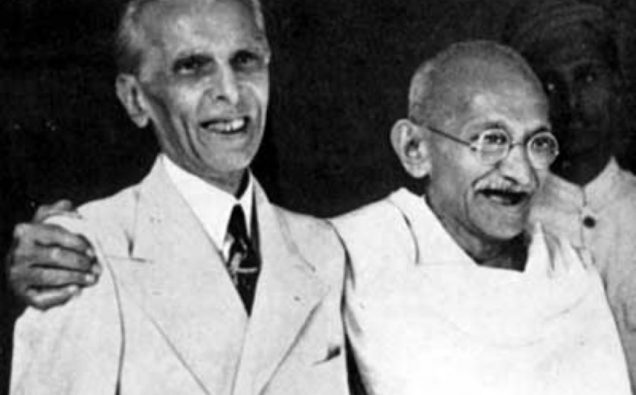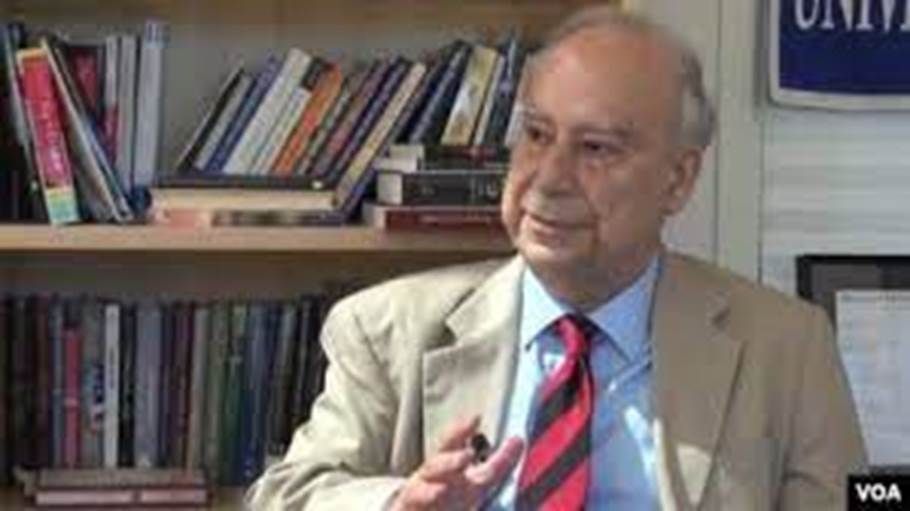
Dr Ahmed’s use of smart multimedia and stage directions adds depth to the play, taking the audience on a visual journey through different locations and eras
What Makes ‘Gandhi and Jinnah Return Home’ Play Relevant to Our Times
By Arif Mansuri
Los Angeles, CA

Dr Akbar Ahmed is a distinguished and world-renowned Islamic scholar, accomplished anthropologist, former Pakistani ambassador to the United Kingdom, and holder of the prestigious Ibn Khaldun Chair of Islamic Studies at American University in Washington, DC. With his vast knowledge and expertise, Dr Ahmed brings this thought-provoking play, Gandhi and Jinnah Return Home which explores the complex relationship between Mahatma Gandhi and Quaid-i-Azam Jinnah, the founding fathers of India and Pakistan, respectively.
Through his insightful storytelling and compelling exploration of the complex relationship between these two iconic leaders, Dr Ahmed has created a work that is both timely and timeless.
With a play as his vehicle, Dr Ahmed transports the audience to the two new nations created by Gandhi and Jinnah in 1947. Like a master painter, Dr Ahmed has blended historical fact and creative imagination to create a rich and vibrant tapestry that offers new insights into the lives and legacies of two of the most important figures in modern South Asian history.
The play delves into the “what if” question of history, which asks what would have happened if these two leaders had seen what was to come and altered their actions. Dr Ahmed skillfully weaves together the historical and contemporary themes in the play, which highlights issues of gender, religious identity, coexistence, pluralism, democracy, and religious fanaticism. These issues are not only relevant to South Asia but also resonate globally.
Dr Ahmed’s use of smart multimedia and stage directions adds depth to the play, taking the audience on a visual journey through different locations and eras. The characters, including Lady Churchill, Churchill, Gandhi, Jinnah, Kasturba, Fatima, and others, are brought to life through their conversations, which highlight their different ideologies and visions for their respective countries.
The play also reflects the tension between India and Pakistan, the two nuclear powers in South Asia, and how the future of the region is tied to the relationship between these two countries.
As an Islamic scholar, Dr Ahmed offers a unique perspective on the relationship between Gandhi and Jinnah, highlighting the importance of empathy and understanding in resolving conflicts and building a better world.
This play is not only a reflection of South Asian history but also a commentary on the current state of the world, where conflicts based on religious, cultural, and political differences continue to plague societies. As we grapple with ongoing conflicts based on religion, ethnicity, and identity, “Gandhi and Jinnah Return Home” offers a timely reminder of the power of empathy and understanding to bridge divides and promote peace.
I highly recommend “Gandhi and Jinnah Return Home: A Play in Three Acts” to anyone interested in South Asian history, culture, and politics. Dr Ahmed’s ability to engage the audience and offer a fresh perspective on the relationship between Gandhi and Jinnah is a testament to his exceptional skill as a writer, scholar, and thinker.
This play is a must-read for anyone interested in understanding the complexities of South Asian history and the challenges faced by the region today. Dr Ahmed’s insights and perspectives are sure to inform, inspire, and enlighten readers for years to come.

Dr Ahmed’s remarkable expertise has earned him high praise from all corners of the world. The BBC called him “The world’s leading authority on contemporary Islam,” and the Saudi Gazette lauded him as “Perhaps the most influential living authority on contemporary Muslim societies” - VOA
I hold Dr Ahmed in special reverence as both a cherished teacher and a beloved brother: It brings me immense joy to see him celebrated as a source of great pride and inspiration for the Muslim community, not only in the United States but also across the globe.
Dr Ahmed’s remarkable expertise has earned him high praise from all corners of the world. The BBC called him “The world’s leading authority on contemporary Islam,” and the Saudi Gazette lauded him as “Perhaps the most influential living authority on contemporary Muslim societies.” Sheikh Hamze Yusuf described him as a “Muslim treasure himself.” Dr Lord Rowan Williams, the former Archbishop of Canterbury, described him as “Perhaps the most distinguished and versatile Muslim scholar in the English-speaking world today.” Professor Stanley Wolpert, the renowned American historian, and author of Gandhi and Jinnah of Pakistan , introduced Ahmed thus: “Akbar Ahmed is the greatest scholar of Islam in America and the world … nobody else stands so high … he is the Dara Shikoh of modern Islamic leaders.”

Priceless dedication by legendary Lord Jonathan Sacks former Ch Rabbi UK in his classic book To heal a fractured world!
The play drew warm and spontaneous appreciation from the audience. Commented Dr Wardella Doschek , author, activist, and administrator Muslim Women’s Association, Washington DC, who was among the audience along with her husband:
“What a powerful play you have created!! So many ideas were presented in such an engaging manner. George and I not only thoroughly enjoyed the play, but we learned a great deal from it as well.
“We thought the cast did an excellent job. I was especially pleased to see Rohan among the cast members! And, of course, the actors playing Gandhi and Jinnah were so very good, as was the entire cast actually.”

